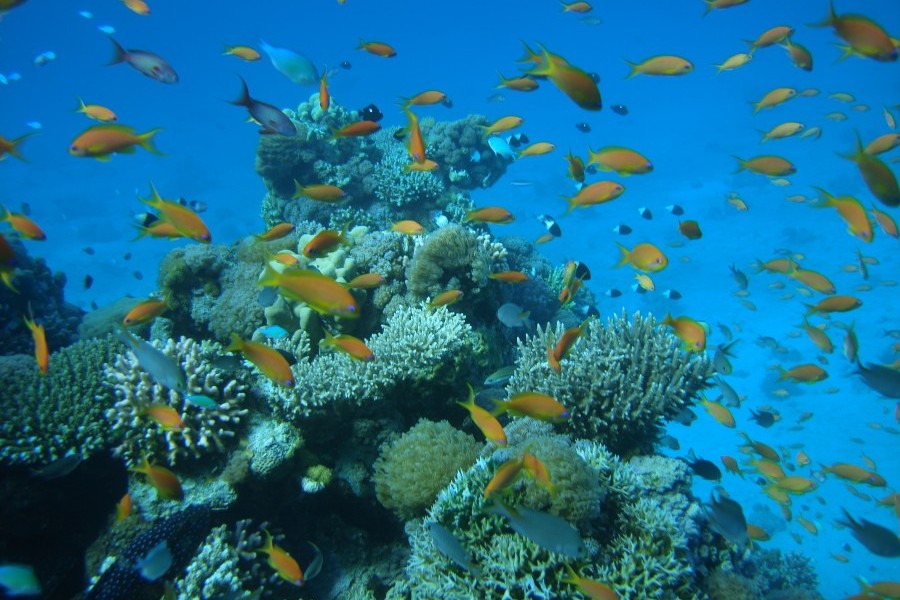New Study shows local environmental stressors reduce resiliency of Red Sea corals to global change
Ocean acidification (OA) is hard to describe. Many do not realize it's even there, but why would they? It doesn’t have a taste or smell. Despite its mysterious nature, OA is impacting the ocean at an exponential rate. Scientists around the world are studying its effects, but Mote Marine Laboratory scientists and their collaborators are asking an even bigger question - what happens to coral reefs when OA is combined with other stressors?
A recent study published in Marine Pollution Bulletin called “Eutrophication may compromise the resilience of the Red Sea coral Stylophora pistillata to global change,” shares the findings regarding the above mentioned question, by looking at how local environmental stressors impacted coral growth and the physiology of corals when reduced pH (OA) and elevated temperature are already causing coral distress. More specifically, how do corals in the Gulf of Aqaba, which is considered to be a coral reef refuge, react to this trifecta of forecasted changes?
Mote scientists, Dr. Emily Hall and Dr. Erinn Muller along with collaborators from Bar-Ilan University, the Interuniversity Institute for Marine Science, University of South Carolina Beaufort, and University of Mississippi worked together to better understand the effects of select forecasted environmental changes (OA, warming, and increased nutrients) individually and in combination on the coral Stylophora pistillata from the Gulf of Aqaba to understand how corals in a potential global climate change refugia may fare in the face of local disturbances, which includes excess nutrients from sewage, fish farms, and flash floods.
Among the findings in this recent study collaborators determined Gulf of Aqaba corals may be resilient to OA and warming, yet a rise in nutrients would severely impede the reef.
“The timeliness of this study is significant as local development continues. This gives everyone the chance to think strategically about how our actions impact even the most resilient corals,” said Hall, the lead author of the study.
Using the Red Sea simulator, a system developed in Israel, the experimentalists altered the conditions in an 80-aquarium, high-tech facility at the Interuniversity Institute for Marine Science and monitored the effects on the corals that are incubated there. They conducted a simulation of future conditions in the Red Sea caused by global warming, and acidification while simultaneously increasing levels of nutrients such as nitrate and phosphate.
When the corals were exposed to rising temperatures and OA, like in previous studies, the researchers saw that they remained extraordinarily resilient. However, when nitrate and phosphate were added, the coral thermal resilience was compromised while symbiotic algal growth benefited from excess CO2 and nutrients.
"We added concentrations of nutrients that are ecologically relevant and we noticed that the physiological performance of the corals was compromised. Their resistance to thermal stress was much lower. Their ability to withstand global factors was lower. And we found that the microbial community on the coral surface changed,” said Hall. “These communities are very important for corals. When we see a shift in the microbial community it is cause for concern because this can lead to coral diseases – just like in the human body, where change in the microbial community can lead to sickness.”
“We’ve shown that local disturbances sometimes compromise the ability of even the most resilient corals to withstand change. Therefore, it is crucial to remove these local disturbances, which also include oil pollution, sewage, coastal development, and other pollutants in order to secure the coral refuge,” said Prof. Maoz Fine, of Bar-Ilan University’s Mina and Everard Goodman Faculty of Life Sciences, who supervised the study. “Given the fact that Israel and her neighboring countries – Jordan, Egypt and Saudi Arabia -- plan to further develop the Gulf and Red Sea coastlines, these activities must be coordinated even though we are in a geopolitical situation that makes it difficult to do so. Coral reefs also contribute greatly to the world economy, so it’s important that the cities of Eilat and Aqaba, Jordan -- which rely heavily on the tourism, biomedical, and diving industries – coordinate and act to preserve them.”
Fine is currently conducting additional studies to examine what affect other local disturbances, such as heavy metals and oil pollution, and other pollutants in the Gulf are having on the coral refuge. “As a small country there is little that Israel can do to reduce global carbon emissions that damage corals, but we can make a real impact by removing local disturbances. If current predictions about climate change continue, we need immediate protection.”
Mote scientists plan to duplicate similar studies at Mote’ s Elizabeth Moore Center for Coral Research and Restoration’s newly improved and significantly bigger, OA testing system. This system was recently updated due to Hurricane Irma. Hall and her colleagues hope to be able to determine if this combination of stressors also impacts the Florida Keys’ coral reef track.
